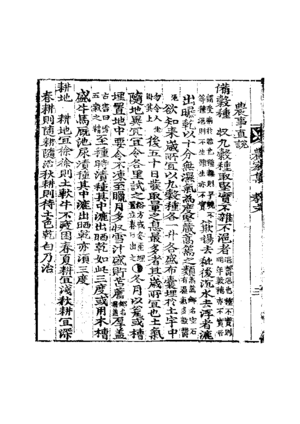Introduction 序文
목차
Introduction
Original Script
| Classical Chinese | First Korean | Final Korean | RDA | NKV | First English | Final English |
|---|---|---|---|---|---|---|
|
|
|
없음 |
없음 |
|
|
Translation and Comments
Student 1: 린지
- Assignment: No. 1, 5, 8
Line 1
| Classical Chinese | First Korean | Final Korean | First English | Final English |
|---|---|---|---|---|
|
○命摠制鄭招等撰農事直說 |
총제(摠制) 정초(鄭招) 등에게 《直說》을 책으로 만들어 올릴 것을 명하였다.. |
총제 정초 등에게 <농사직설>이란 책을 만들라고 명하였다. |
Regulator-General Chŏng Ch'o and others were ordered to compile Concise Farming Theory. |
Regulator-General Chŏng Ch'o (?-1434) and others were ordered to compile A Concise Theory of Farming. |
Discussion
It will be important to add these terms and historical figures to the glossary We should make internal wiki links to terms and historical figures Lyndsey (토론) 2018년 3월 13일 (화) 20:27 (KST)
Line 5
| Classical Chinese | First Korean | Final Korean | First English | Final English |
|---|---|---|---|---|
|
○帝舜之命, 九官十二牧[9], 首曰食哉惟時, |
순임금이 9관(官)과 12목(牧)에게 명을 내릴 때 가장 먼저 이르기를 ‘먹는 것은 농사의 때에 달렸다.’ 하였으니, |
순임금이 9관(官)과 12목(牧)에게 명을 내릴 때 이르기를 가장 먼저 “양식을 생산하는 것은 때를 놓치면 안 된다”고 하셨다. |
In the sage king Shun’s order to his nine ministers and twelve governors, he first said: “Crop yields! They depend entirely on timing.” |
In the sage king Shun’s order to his nine ministers and twelve governors, he first said: “Crop yields! They depend entirely on timing.” |
Discussion
Line 8
| Classical Chinese | First Korean | Final Korean | First English | Final English |
|---|---|---|---|---|
|
○附註鄕言, 刊板頒行, 敎民力本, |
향언(鄕言)으로 주(註)를 달아서 판각(板刻) 반포하게 하여, 백성을 가르쳐서 농사에 힘쓰게 하셨다. |
향언(鄕言)으로 주(註)를 달아서 판각을 만들고 책을 인쇄, 반포하여 백성을 가르쳐서 농사에 힘쓰게 하셨다. |
attach commentary in the vernacular language, carve the woodblocks, print them out and distribute the copies, enlighten the people and have them focus on the fundamental task of farming. |
attach commentary in the vernacular language, carve the woodblocks, print them out and distribute the copies, enlighten the people and have them focus on the fundamental task of farming. |
Discussion
鄕言 native Korean ? esilrok? 鄕名(향명)은 예전부터 민간에서 불러 오는 이름[10], 시골말[11] 이다. AKS project에는 vernacular name[12]으로 번역되었고 Joseph Needham은 wrote in the vernacular[13]라는 표현을 사용하였다. Oxford 사전은 지방명은 local name, 방언은 vernacular[14]로 번역한다. 이 용어는 표준어에 대응하는 시골말이라기보다는 한자어에 대응하는 한국어로 보는 것이 옳다고 본다. 농사직설은 1446년 훈민정음 반포 이전인 1429년에 편찬되었고 한자어와 향명만 기록되어 있기 때문이다. 또한 농민들은 한자를 몰랐기 때문에 향명이라 함은 한자어에 대응한다고 봐야 하기 때문이다. 따라서 local name(or Korean local name)이 적절하다. Lyndsey (토론) 2018년 3월 13일 (화) 20:09 (KST)
Student 2: 에벨린
Student 3: 권지은
Student 4: 안카
Student 5: 이창섭
Student 6: 강혜원
Glossary
| Type | Hanja | Hangeul | MR | RR | English |
|---|---|---|---|---|---|
| Title | 摠制 | 총제 | ch'ongje | chongje | Regulator-General |
| Person | 鄭招 | 정초 | Chŏng Ch'o | Jeong Cho | |
| Document | 農事直說 | 농사직설 | Nongsa chiksǒl | Nongsa jikseol |
|
Further Readings
References
- ↑ [발표자 주] 오방: 동·서·남·북·중앙의 총칭.http://baike.baidu.com
- ↑ [발표자 주] 풍토: "여기서 풍토라고 부르는 것은 어떤 토지의 기후, 기상, 지질, 토양, 지형, 경관 등의 총칭이다."와쓰지 데쓰로(和辻哲郎)는 그의 저작 『풍토』 본론의 서두에서 <풍토> 개념을 이와 같이 규정한다[『전집』 제8권, 7]. [네이버 지식백과] 풍토 [風土, Klima, climat] (현상학사전, 2011. 12. 24., 도서출판 b)
- ↑ [발표자주] 樹藝:“樹蓺”로 쓰기도 한다. 의미는 재배하고 종자를 뿌리는 것이다. 『孟子』 滕文公, 上. “後稷教民稼穡, 樹藝五穀.” 후직이 백성에게 농사를 짓는 방법과 오곡을 재배하는 법을 가르쳤다.耕耘樹藝에서 ‘耕’은 ‘땅을 갈기’, ‘耘’은 ‘잡초를 제거하기’, ‘樹’는 ‘심고 재배하기’, ‘藝’는 ‘씨를 뿌리기’를 각각 지칭하며 농업 생산 활동을 말한다.『荀子』 子道. “夙興夜寐, 耕耘樹藝, 手足胼胝, 以養其親” 아침에 일찍 일어나 밤에 늦게 자면서, 밭 갈고 김매고 심고 뿌리느라 손과 발에 못이 박히도록 일하며 그의 부모를 봉양하는데
- ↑ 中外: 조정(朝廷)과 민간(民間)
- ↑ King T’aejong (r. 1400-1418)
- ↑ King Sejong (r. 1418 - 1450)
- ↑ King Sejong (r. 1418 - 1450)
- ↑ [Team C’s footnote] King Cheng of Zhou 周成王 (r. 1116-1079 BCE) was the second king of the Zhou dynasty 周 (11th cent.-221 BCE). He stabilized Zhou Dynasty’s border by defeating several barbarian tribes along with his uncle, the Duke of Zhou.
- ↑ [발표자 주]十二牧:순임금이 통치하는 12개의 행정구역 및 행정 장관. -- 蔡沈(1167—1230)《書集传》“十二牧,十二州之牧也。”12목은 12개 행정구의 통치관이다.)
- ↑ 한국한자어사전(http://hanja.naver.com/search?query=%E9%84%95%E5%90%8D, 2017.12.02.)
- ↑ 김영진, 앞의 책, 46쪽; 농촌진흥청, 앞의 책, 208쪽.
- ↑ Academy of Korean Studies, op. cit., p. 62.
- ↑ Needham, Joseph, op. cit., 1984, p. 88.
- ↑ Oxford Advanced Learner’s English-Korean Dictionary (http://endic.naver.com/search.nhn?sLn=kr&searchOption=all&query=local%20name; http://endic.naver.com/search.nhn?sLn=kr&searchOption=all&query=vernacular, 2017.12.02)
